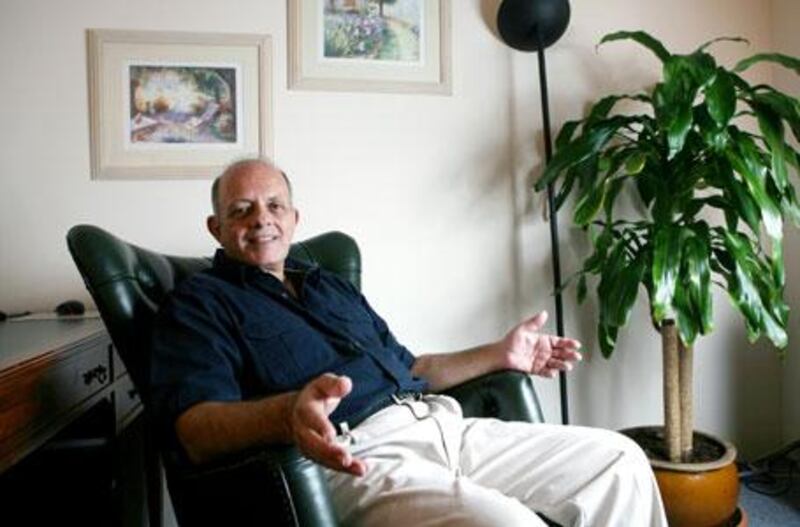Dubai's busiest mental health pundit. As a young man in his native United States, Raymond Hamden dreamed of being an airline pilot. He pursued that goal vigorously, and earned his commercial license at the tender age of 22 in 1973. The one day, out of the blue, he woke up and discovered he didn't enjoy the business of flying as much as he thought he would. "I got into psychology to understand why I wasn't satisfied with that," he says. "And psychology turned out to be my career."
If you live in the UAE - or maybe even if you don't - there's a reasonable chance you've heard Hamden's name or seen his face on TV. Although his practice as a clinical psychologist takes up about half his time, Hamden is also, as one longtime Dubai resident put it to me, "the shrink version of a celebrity chef". Over the last three decades, Hamden has made a name for himself as a psychologist of terrorism and hostage situations. Beyond writing and contributing to several books (on that subject and others), Hamden is a tireless media pundit and consultant on all matters psychological - his biography lists appearances on CNN, Al Jazeera and "many others". He currently has a regular slot on Dubai Eye, and has plans to launch a syndicated radio show called In the Psychologist's Chair, which he hopes will eventually be adapted for TV. By early next year, he'll have another book out, The Psychology of Terrorists: Profiling and CounterAction. In 2007, he started advising the European Space Agency on the psychology of space travel, in advance of an upcoming mission to Mars.
Closer to home, the Dubai Health Authority last year selected Hamden to head up a systematic effort to establish ethical and legal standards for psychologists in the emirate. This work hasn't endeared him to those who make a good living doing past-life regression, but Hamden doesn't particularly care. "There are too many cowboys in the industry," he says. "We need to put laws together to protect society. This is a mandate from Sheikh Mohammed."
A first generation Lebanese-American, Hamden became a Dubai resident in 1990, after 11 years of practicing in Washington, DC. Back then, the psychology field in Dubai was considerably less developed that it is now, rife with what Hamden calls "quackery and charlatanism". Hamden, meanwhile, was already the consummate professional - his PhD in psychology was backed up by a laundry list of adjunct certifications and publications, and his hands-on experience included testifying before the US Senate on the subject of suicide attacks.
It's not clear why Hamden chose to join the ranks of hippies and hacks operating in Dubai back then. His own explanation is oblique: "I'd gotten involved with international consulting, and I had the chance to do that in the UAE," he says, sipping a lemon juice at a small cafe near his Knowledge village offices. When asked to elaborate, Hamden says: "I help forensic people investigate certain kinds of individuals," then briskly changes the subject.
Today, Hamden runs his own practice, called The Human Relations Institute, which employs eight psychologists and offers services in everything from family issues to the psychology of advertising. He also does forensic work, ranging from providing expert testimony in criminal cases to investigating corporate crime. His real speciality, however, remains the psychology of terrorism: this is the work that has formed the backbone of his career as an author and media darling, and that has taken him to places like Afghanistan, Saudi Arabia, Israel, Syria, Algeria and Iraq.
Any suggestions that there may be a cloak-and-dagger aspect to all this is met with a steady, withering gaze. "I'm an analytical expert, not operations," Hamden says. "I train individuals and organisations on how to do profiling on terrorists, or criminals in an international situation." He adds, choosing his words carefully, "Today, in private practice, living in the Middle East, I am not involved with any government or quasi- government organisations." The doctor is very clear on this point: "I don't do James Bond."
Maybe not. But he has at least established himself as a go-to guy for people who need to understand what makes terrorists tick, which probably includes a few James Bond types. In 1986, the same year he testified before the US Senate, Hamden was credited with coining a new term, the "Retributional Terrorist" - used to describe those who take up clandestine violence to avenge a family member or community. He expands on this theme in his new book, which, he says, will serve as a reference for homeland and private security professionals.
"The book looks at four kinds of individuals," he says, referring to his distinction between Retributional, Religious, Political and Psychopathic terrorists. "If you're called in to help with a particular situation, this text will show you what information is valuable in counteracting people who show these characteristics. It is not the answer to stopping terrorism; it's to help people understand why terrorists do what they do." He adds, "I'm one of the few people in the field who has had real international experience. I've talked to these people, the good guys and the bad guys."
Now and then, between sips of juice, Hamden does suggest that his work used to be a little more, erm, adventurous than it is now - "back in my young days, a long time ago". When asked if he's ever seen any real action, Hamden says, "I have a lot of experience around the world with different situations." A moment later, he applies swift and deadly force to a spider that's crawled onto his sweater.
"Oh well," he says a little awkwardly. "These things happen." *Chris Wright





